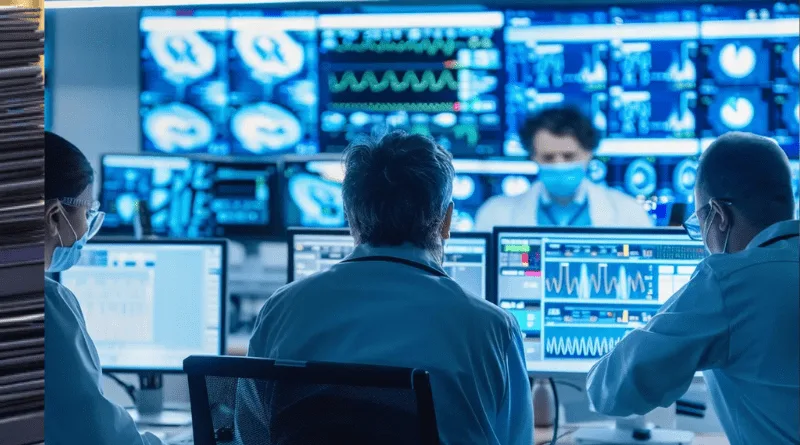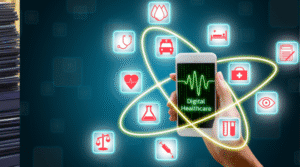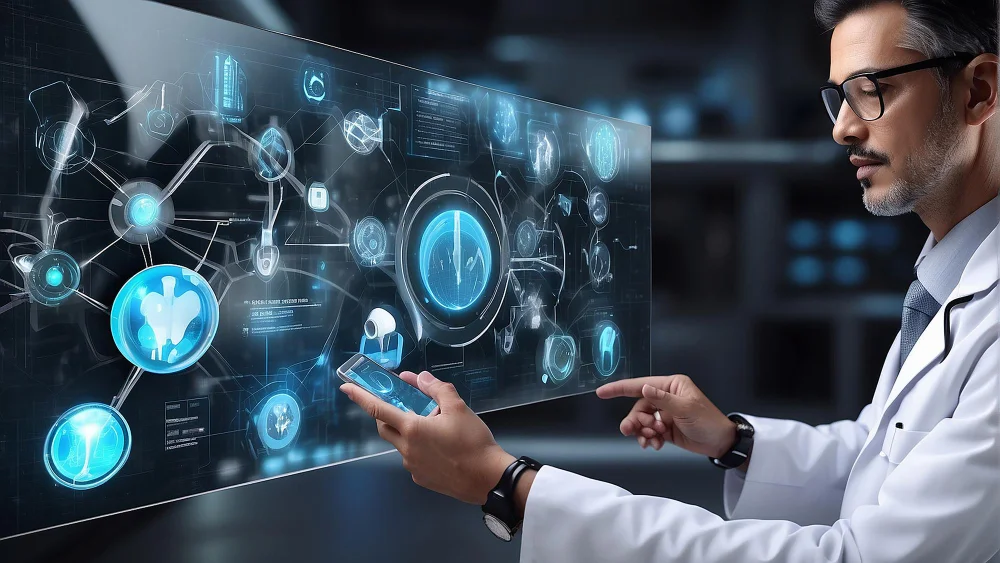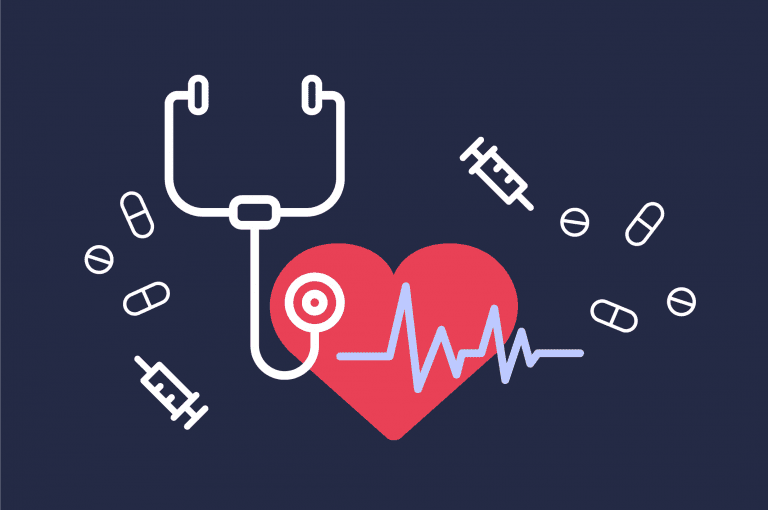Artificial Intelligence in Healthcare: How Data is Redefining Diagnosis and Treatment?

The healthcare and diagnostic medicine sector is undergoing a radical transformation thanks to the growing interest in artificial intelligence (AI). AI is no longer just a futuristic concept; it is a reality that is transforming the way medical care is delivered.
AI has tremendous potential to collect and analyze patient data with extreme precision, from medical history and examinations to details of treatments provided. What’s even more astonishing is that, in some cases, it can achieve diagnostic accuracy that surpasses even the most experienced doctors. AI relies on the meticulous analysis of the data it records, and its capabilities are improving day by day thanks to its ability to continuously learn.
Join us on this journey to explore how AI applications are redefining the future of healthcare.
Applications of Artificial Intelligence in Healthcare
Artificial intelligence has revolutionized the healthcare sector, offering innovative solutions that contribute to improving the quality of care, increasing efficiency, and reducing costs. Here are its most prominent uses:
Accurate and Early Diagnosis of Diseases
This field is considered one of the most important and influential applications of artificial intelligence, as the first step towards appropriate treatment is a correct diagnosis. Given AI’s ability to analyze massive amounts of medical data, it is capable of diagnosing medical conditions with extreme accuracy, as follows:
· Scanning and recording medical images: such as x-rays, MRIs, CT scans, and retinal images. AI can detect highly subtle patterns that indicate the presence of diseases such as cancer, diabetic retinopathy, or heart disease, even in their early stages, which may be difficult for the human eye to detect.
· Patient Health Records: Analysis of medical history, lab test results, and reported symptoms to help identify potential diagnoses accurately and quickly.
· Symptom Analysis: AI-powered virtual assistants can analyze patients’ symptoms and provide potential diagnoses and suggestions for next steps.
Developing Personalized Treatments and Drug Discovery
· Personalized Medicine: By analyzing a patient’s genetic and medical data, AI can help identify the most effective treatments tailored to each individual, increasing the chances of treatment success and reducing side effects.
· Drug Discovery and Development: AI is significantly accelerating the research and development process for new drugs. It is capable of simulating and testing thousands of potential compounds in a short time, predicting their efficacy and side effects, and identifying ideal candidates for clinical trials, reducing costs and time spent on the procedure.
Robotic-Assisted Surgery
AI-powered robots are being used in microsurgery to enhance precision and reduce human error. These robots can:
· Assist surgeons in performing complex surgeries with extreme precision in hard-to-reach areas.
· Reducing the size of wounds and patient recovery time.
· Providing a magnified 3D view of the surgical area.
Health Data Management and Improving Administrative Processes
· Electronic Health Records (EHR): AI facilitates the entry, updating, and analysis of medical records, freeing doctors and nurses from routine administrative tasks to focus on patient care.
· Appointment Management and Resource Scheduling: AI systems improve patient scheduling, hospital bed management, and the efficient allocation of human resources and equipment.
· Supply Chain Management: Improves inventory management of medications and medical equipment, anticipating needs to ensure timely availability.
· Financial and Operational Performance Analysis: AI provides data-driven insights to help hospital administrators make informed decisions to improve operational efficiency and reduce costs.
Remote Care and Continuous Patient Monitoring
· Telemedicine: AI can support remote care platforms by analyzing remote monitoring data, providing recommendations, and helping patients obtain medical advice without having to visit the hospital.
· Wearable Monitoring Devices: Analyze vital data from wearable devices such as smartwatches to detect any abnormal changes in a patient’s health and send early alerts to physicians.

Virtual Health Assistants and Chatbots
· These tools provide reliable health information, answer patient inquiries, remind patients of appointments or medications, and offer initial support.
· These tools improve the patient experience by providing personalized health information and advice.
Artificial Intelligence and Remarkable Successes in Various Fields of Medicine
Here are some real-life examples that highlight how AI is changing the face of healthcare:
In Complex Surgeries: Intelligent Robots
One of the most notable developments in this field is the use of AI-powered surgical robots, such as the da Vinci Surgical System.
This system is used in thousands of hospitals around the world to perform a wide range of surgeries, including cardiac, prostate, oncology, and colon surgeries. The da Vinci System does not perform surgery autonomously, but rather enhances the surgeon’s capabilities through:
· Magnified 3D Vision: Provides a high-resolution view of internal tissues.
· Precise Robotic Arms: With 360-degree movement, they exceed the flexibility of the human hand and eliminate any potential vibration from the surgeon’s hand, allowing for precise suturing or the removal of very small tumors.
· Minimally Invasive Surgeries: Reduce the size of surgical incisions, resulting in less pain, less blood loss, and a faster recovery period for the patient.
Autonomous Robotic Surgery (STAR – Smart Tissue Autonomous Robot):
In an exciting development, the STAR robot successfully performed endoscopic surgery on live tissue (in a pig) semi-autonomously in 2022. Importantly, it demonstrated the ability to adapt to unexpected changes during surgery and respond to voice commands. This represents a major step toward more autonomous and adaptable robotic surgeries in the future.
In Accurate and Early Diagnosis: Medical Image Scanning and Data Analysis
AI has proven highly effective in analyzing medical images and clinical data to diagnose diseases in their early stages, as follows:
Diagnosing Eye Diseases:
AI systems are used to analyze retinal images to diagnose diabetic retinopathy (which can lead to blindness), macular degeneration, and glaucoma with high accuracy. Google has developed an AI system that can detect diabetic retinopathy from eye images with an accuracy comparable to that of specialized ophthalmologists. Cancer Detection:
Breast Cancer: AI systems analyze mammogram images to identify tiny tumors or calcifications that may be early signs of cancer, increasing early detection rates and improving treatment opportunities.
Lung Cancer: AI algorithms help analyze chest CT scans to accurately identify suspicious lung nodules, supporting doctors in making diagnostic and treatment decisions.
Stroke Diagnosis:
In emergency situations such as strokes, AI tools can rapidly analyze brain CT scans to determine the area of damage and the type of stroke, whether ischemic or hemorrhagic. This helps doctors make rapid treatment decisions, as time is critical in these cases to save the patient’s life and reduce disability.
Drug Discovery and Development:
Accelerating the Process and Inventing New Therapies
AI significantly reduces the time and costs associated with drug discovery and development, opening new avenues for treatments for intractable diseases.
Insilico Medicine company:
This leading company uses generative AI to discover both therapeutic compounds and biological targets. The company has successfully developed a drug candidate for idiopathic pulmonary fibrosis (IPF), a fatal chronic lung disease. This drug, called Rentosertib, has entered clinical trials, marking a significant milestone as it was designed and discovered largely with the help of artificial intelligence.
Drug Repurposing:
AI can analyze massive sets of clinical and genetic data to identify new uses for existing drugs, accelerating the availability of new treatments.
In Personalized Medicine: Tailor-Made Treatments
AI enables the analysis of each patient’s unique data to deliver more effective and personalized care and treatments.
Artificial intelligence has opened up unprecedented possibilities for accurate diagnosis, effective treatment, and drug development. Thanks to its ability to analyze massive amounts of data, AI has become an indispensable tool for helping doctors and researchers gain a deeper understanding of diseases and deliver more personalized and effective healthcare.
Also Read
- a-chinese-humanoid-robot-cooks-using-virtual-reality
- brain-computer-interfaces-when-telepathy-becomes-a-technological-reality
- will-tiktok-go-bankrupt-after-the-new-us-decisions




